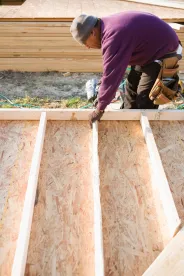The Massachusetts Appeals Court recently overturned a trial court decision and held that a home improvement contractor was liable to the homeowners under Massachusetts General Laws (M.G.L. c. 93A) for building code violations even though the jury found that the homeowners directed the contractor to perform the work contrary to the building code. Downey v. Chutehall Construction Co., Ltd., No. 14-P-1062, 2016 Mass. App. LEXIS 1 (Jan. 6, 2016). Chutehall Construction Co., Ltd. (“Chutehall”) was hired by Christopher and Mairead Downey to replace the roof and roof deck on their Beacon Hill townhouse. Chutehall’s initial proposal and final bill both included a line item for stripping off the existing roof. In performing its work, Chutehall did not remove the existing roof, but instead installed the new roof on top of the existing roof. It is important to note that the local building code provided that there can be no more than two layers of roofing on the building.
A few years after the work was completed, the Downeys had some HVAC work performed and learned at that time that there were four layers of roofing materials on their building and that the roof was leaking. The Downeys hired a new contractor to strip the entire roof and install a new one and reinstall the deck. They then brought suit against Chutehall seeking the costs they incurred for this work.
Chutehall defended against the lawsuit arguing that the Downeys represented to Chutehall that the existing roof only had one layer, refused to allow Chutehall to perform test cuts to determine the number of layers, and instructed Chutehall to install the new roof on the existing roof.
After a trial, the jury found that Chutehall had violated the building code by installing the new roof on three layers of existing roof. Although the Massachusetts Home Improvement Contractor Law (the “HIC Law”) specifically provides that performing work contrary to the building code is a violation of M.G.L. c. 93A, the Consumer Protection Act 1, the jury, in accordance with the Court’s instructions, awarded no damages because they found that the Downeys directed Chutehall to perform the work contrary to the building code. In essence, the Downeys’ had waived compliance with the building code and the waiver provided Chutehall a complete defense to Chapter 93A liability.
The Downeys appealed arguing that a contractor cannot use a homeowner’s oral waiver of building code requirements as a defense to liability for a violating the code and, consequently, Chapter 93A, particularly where the code issue involves public safety. The Massachusetts Appeals Court agreed, holding that to allow a homeowner to waive his or her rights under the HIC Law, including seeking damages for a violation of Chapter 93A, would undermine the public policy behind the HIC Law. The Court also ruled that allowing a waiver of the building code, which is intended to provide for the public’s safety, would encourage contractors and homeowners to waive code requirements on future projects to save money. Such a result would increase the risk of danger to homeowners, first responders and the public in general.
Take Away
The Appeals Court’s decision makes it clear that a home improvement contractor must perform its work in strict accordance with the building code despite requests from a homeowner to ignore code requirements to save money. This case further emphasizes the importance of documenting scope of work in contracts. The Appeals Court’s holding is specifically limited to the facts here, where the homeowner orally waived compliance with the building code, but the result may have been different had the contractor documented in a contract that the existing roof had only one layer of material and that the contractor was to apply the new roof to the existing roof. Clarity in scope is essential to reducing the possibility of disputes on a construction project, for both parties.





 />i
/>i

